Maritime women in martial arts face challenges inside and outside the cage
MMA audiences, promoters want to see women compete, but there is a shallow pool of fighters
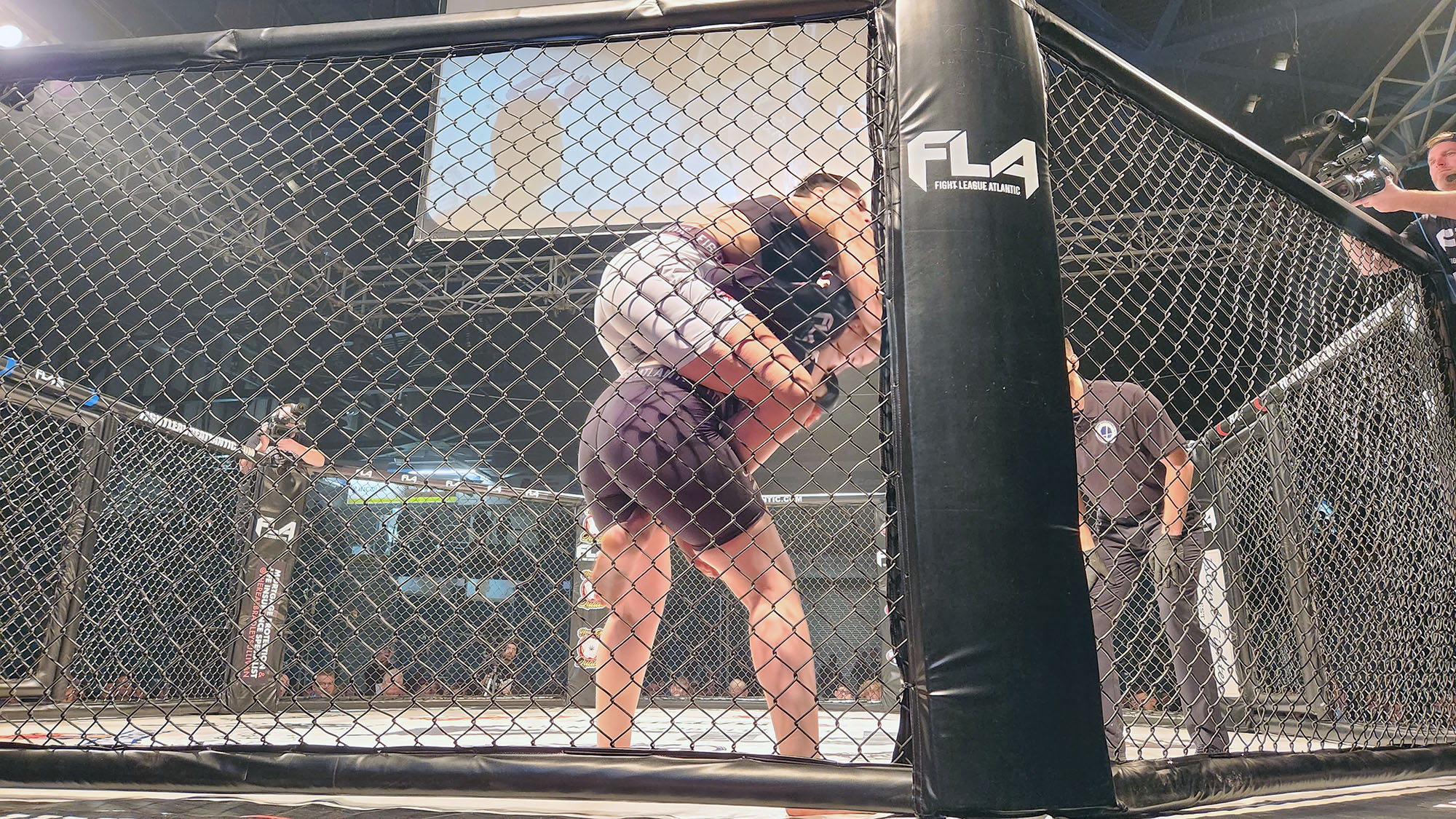
caption
Charlene Barkhouse climbs her opponent's back to finish her debut MMA fight in Moncton on Nov. 19.A woman from Wolfville stepped inside of a cage for her first fist fight on Nov. 19 at Fight League Atlantic 6 in Moncton Coliseum.
Charlene Barkhouse put on a dominant performance in her mixed martial arts debut. She controlled her opponent, Lumi Rhodes, through two three-minute rounds of fighting, before climbing Rhodes’ back and defeating her with a chokehold.
“I wanted a new challenge,” Barkhouse said. “I’m very goal-oriented, so having the opportunity to compete and to push myself, and something to work towards makes a difference for me.”
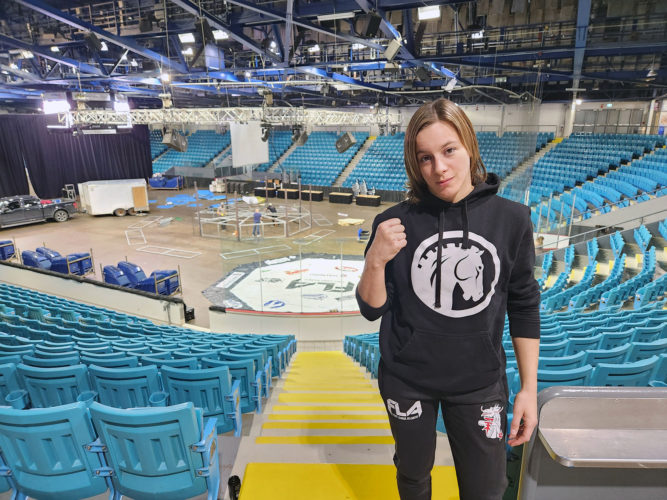
caption
Barkhouse in Moncton Coliseum before her debut fight at Fight League Atlantic 6.Barkhouse is trying to enter a tough field for women. In addition to the usual barriers faced by female athletes, there aren’t enough women fighting in the region to get experience competing. Even so, the ones who are here are willing to travel hundreds of kilometres for their next fight so they can get ahead in their sport.
Barkhouse, 34, waited two years for her first fight. She said that there is an audience for women’s MMA, so promoters are offering opportunities, but the shallow talent pool makes it hard to find matchups.
“A lot of it has to do with COVID and finding women to compete with in the right weight class,” Barkhouse said.
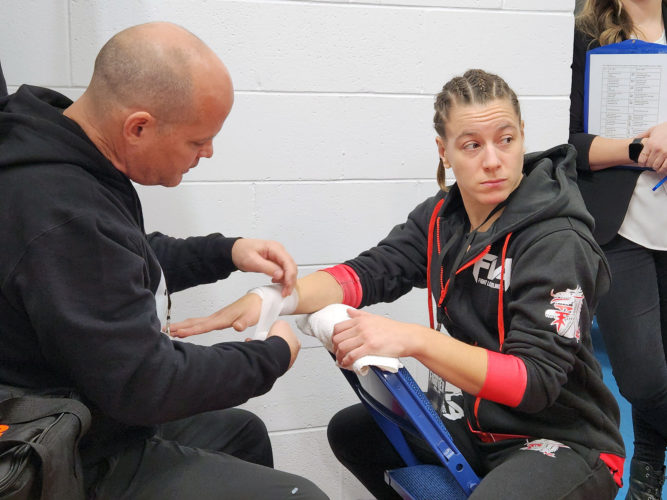
caption
Barkhouse focuses while her coach, Peter Campbell, wraps her hands in preparation for her first fight.“If I were younger, and I had more time left, it would have held up my experience and growth,” Barkhouse said.
She said mixed martial arts is a “hobby career.” Her fight against Rhodes was under an amateur rule set, but Barkhouse said she wants to turn professional and start earning money.
Matt McGrath is the owner of Renzo Gracie Lot 36 team in Prince Edward Island. He’s had a lengthy career as a fighter and coach. His prospect, Maria Clinton, 24, travelled to the U.S. for her third fight. Clinton wants to turn professional for her next match, but she is struggling to find an opponent.
“If you want to go further, you’ve got to cut weight, and you’ve got to play the game,” McGrath said. He said women can find a fast route to the top because there are gaps from the regional scene through the highest levels of MMA, but there are dangerous realities about the sport that all athletes need to consider.
Clinton said martial arts are a great way to boost your confidence. She said she doesn’t think about the rigours of training or cutting weight.
“It’s definitely dangerous, but it’s part of the sport and it’s got to be done,” Clinton said. She went outside of the Atlantic region to get a fight at her desired weight of 115 pounds.
“Nobody in the Maritimes is willing to go that low,” McGrath said.
For her last fight in the Maritimes, Clinton fought Sarah Wilson, 34. Wilson is an accomplished jiu jitsu competitor who trains out of Sprawl or Brawl in Glace Bay. She is competing at the International Brazilian Jiu Jitsu world championship in December.
MMA is a hybrid sport. Athletes blend grappling disciplines, like wrestling and jiu jitsu, with striking disciplines like boxing. Many competitors train and compete in more than one martial art before making the transition to the more permissive rules of MMA.
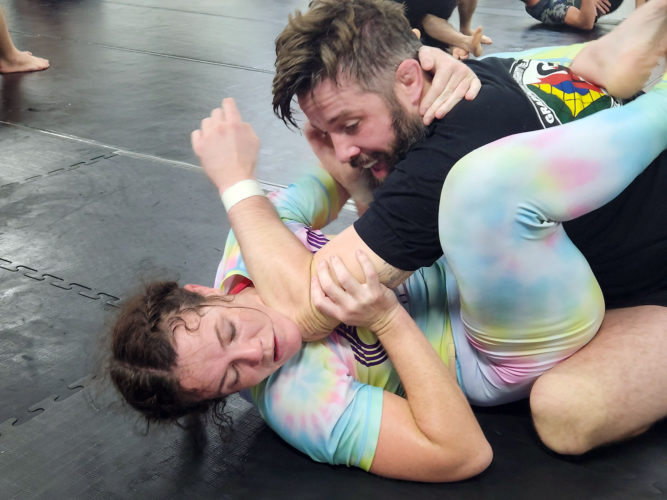
caption
Sarah Wilson is accustomed to training with men.Wilson said she considers herself well-researched on weight cutting.
“When you are looking for competitive advantages, weight cutting comes up,” Wilson said. She dropped about 15 pounds to make 125 pounds for her MMA debut against Clinton.
“I actually try, as a rule, not to do it,” Wilson said. She said the financial burden of her martial arts aspirations is higher than the physical toll.
“I max out my credit card flying around to compete,” Wilson said. “Combining traveling and competing or traveling and training. I call them my traincations.”
Wilson said travel is her first love, but she hopes the quality and frequency of competition grows in the Maritimes.
After her first fight, Barkhouse said she is comfortable in her weight class, so, like Clinton and Wilson, she is expanding her search for opponents. She said she’s encouraged that promoters are bringing in talent, like Rhodes, 28, who came from Ontario, but more could be done to promote women’s martial arts in the Maritimes. She said gyms should add women’s only classes if they want the local scene to grow.
“I’m often the only woman in class,” Barkhouse said. She said there is value in training with both sexes, but the physical intimacy of jiu jitsu can be frightening for anyone who’s experienced trauma.
WTF Women That Fight is a women’s only jiu jitsu group that had their first event in 2010. They hold training sessions and competitions throughout the Maritimes. The founder, Courtney Pratt, 41, said WTF is a support group for women in the Atlantic region who want to train and compete. Barkhouse and Wilson have both taken part in WTF events.
“When I was competing, these were basement tournaments,” Pratt said. “The sport has come a long way.” Pratt said that good gyms strive to be clean and welcoming today, but that wasn’t always the case. She said that most facilities are better equipped for women now, but the atmosphere could be more inviting.
“Women’s only classes make it clear that this sport is for women,” Pratt said. She said that gyms should put women in leadership positions to emphasize their importance to the team and the environment. Pratt said safer, adaptive weight class models would eliminate weight cutting and encourage more women who train to compete.
“What if you had everyone register at their weight, and then you put them into their closest bracket?” Pratt said.
Pallas Athena Women’s Fighting Championship is an all-female mixed martial arts promotion in Calgary. Chief operating officer Jennica Wheeler said her company hopes to capitalize on the gap she sees in the market for women’s fighting.
“I know that there is an appetite for it,” Wheeler said. “We just need to localize it so we can fill the venue.”
Wheeler said her company is one of two all-female fight promotions in North America including Invicta Fighting Championships. Pallas Athena has a database of over 300 fighters from around the world. Wheeler said the promotion performed well during the pandemic, but they are still trying to establish a local core of fighters with a stable fanbase.
Wheeler said she wants to set an example for men’s and women’s mixed martial arts promotions that others will follow to eliminate unhealthy practices, like weight cutting, from the sport.
“We are an athlete’s first organization,” Wheeler said. She said she wants to change the culture of the sport so women will feel empowered, not exploited, by mixed martial arts.
Wheeler said that fighters on the east coast who want to get ahead need to do what Barkhouse, Clinton and Wilson are doing; travel and get experience. She said that women who are willing to fight in Calgary should get in touch with Pallas Athena.
Barkhouse started training nine years ago at Abhaya Mixed Martial Arts in Wolfville. She said she might not take a fight in the Maritimes even if she could find one because the women training in the region are part of her extended team.
“We’re quite close-knit,” Barkhouse said. “You don’t want to be fighting against someone from your home-team-away-from-home.”
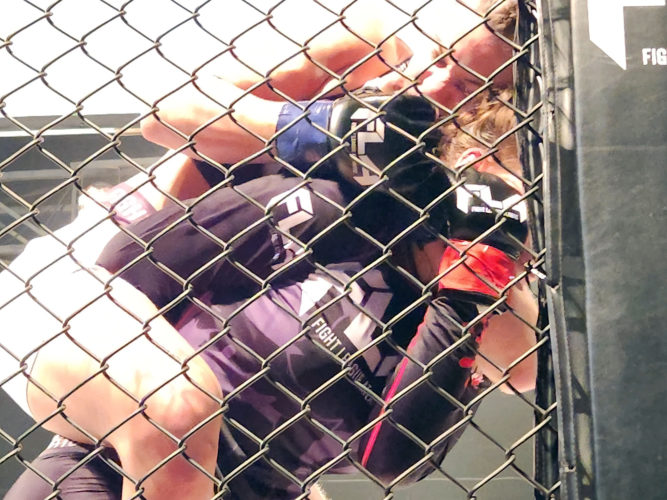
caption
Charlene Barkhouse hunts for Lumi Rhodes’ neck to finish the fight during their match on Nov. 19.Barkhouse said she would train even if she weren’t competing because of the physical and psychological benefits, but she feels most empowered when she is preparing for a fight.
In an interview after her match with Rhodes, she expressed gratitude for finally getting the opportunity to test herself. She said she was uncertain about her future, but she had a good idea where her next training camp would start.
“I’ll look for another opponent and go from there,” Barkhouse said.
About the author
Jeremy Hull
Jeremy Hull works for CBC. He's published in magazines throughout the Maritimes. He's happiest when writing about jiu-jitsu or fly fishing. Jeremy...

P
Paddy